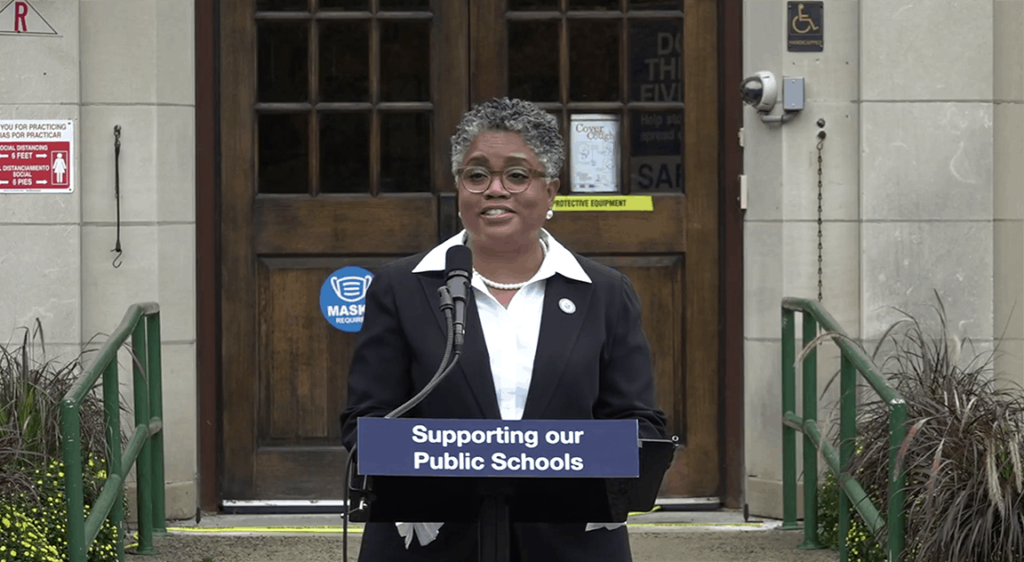As the culture wars rage across the country, New Jersey is having its moment in the sun. The new sexual health and education learning standards, issued by the Murphy Administration
‘s Department of Education and approved by the State Board two years ago,
are causing a ruckus among those who think sexual education should be the provenance of the home, those who regard the standards as a pornographic overreach of the fringy far left, and those who consider the course content appropriate. The mayhem is also an emblem of national political polarization and a rising distrust in traditional public schools after two years of closures, remote instruction, and significant learning loss. For instance, trust in teachers has declined by 6 percentage points
since 2019; Robert Pondiscio writes, “Americans’ relationship with local public schools is not as solid, reliable, or unshakable as it has been historically.”
New Jersey’s educational issues were front and center at yesterday’s State Senate Budget and Appropriations Committee meeting, where the Gov. Phil Murphy’s Education Commissioner, Angelica Allen-McMillan, made a rare public appearance. Politico’s Carly Sitrin has an excellent summary which is behind a paywall so here are the highlights (emphases my own):
- “Senate Majority Leader Teresa Ruiz (D-Essex) began the questioning by asking Allen-McMillan about the department’s efforts to address learning loss, standardized testing results and the digital divide. Allen-McMillan, who has skipped education committee hearings in the past and has not done press for interviews since her nomination, said the department is urging local districts to spend their federal funds in those areas.”
- “Allen-McMillan also revealed the DOE currently has 108 vacancies in a department tasked with overseeing more than 600 school districts educating some 1.3 million students statewide.”
- Republicans lit sharply into the DOE for the new sex education standards, which Murphy walked back briefly, saying they were “intentionally misrepresented” until the the next day when the DOE issued a “clarification” that noted specific curricula were at the behest of local school districts. After Senator Mike Testa expressed concerns, those assembled had their “first chance to hear directly from Allen-McMillan on the issue.”
- Allen-McMillan replied that the material Sen. Holly Schepis labeled “salacious” is “not affilliated with the Department of Education,” referring to controversial videos and sample lesson plans that have been circulating on social media and in local parent groups. “The state DOE’s website does not link to the lesson plans or videos directly, but does include a link to the Rutgers University-affiliated Answer organization, which partnered with Advocates for Youth, the progressive sex-ed group, to produce two of the controversial videos.”
- Allen-McMillan reiterated that sex ed has been in place in some form in New Jersey since the early 1980s and parents have always maintained the right to opt-out of “any lessons that they deem are in conflict with their beliefs or religious practice.” She assured the audience that the material selected by the DOE was “appropriate” and the DOE has “taken great pains to ensure our process is thorough.”
- All concerns, she said, should be dealt with at the local level: “’We believe that our school systems are skilled in communicating with their community members, parents and students, and that this process should continue and this is an opportunity for our school district leaders who…have the experience and the expertise to navigate this without the weaponizing of third party information being put upon the state as if it is our message and it is not,’ Allen-McMillan said.”
- “In all, the Senate spent some 22 minutes on back and forth about sex ed and curriculum standards including one instance in which Testa protested a sample lesson plan recommended teaching second-graders about the location of the clitoris. The exchange inadvertently introduced the female anatomy to children in attendance or listening online as part of the statehouse’s ‘Take Your Child to Work Day.'”
- Compellingly, Allen-McMillan noted her intent to make “that 5-year-old and other groups of students, particularly those in the LGBTQIA community, students who do not necessarily feel that they fit, have a safe place to learn and feel that they belong.”
In discussions of school funding, Testa said the Legislature intends to send Gov. Murphy a budget that will increase spending on extraordinary special education, i.e., funding for students who have extreme and expensive needs. Murphy’s current budget has that funding flat since last year’s allocation of $400 million.



